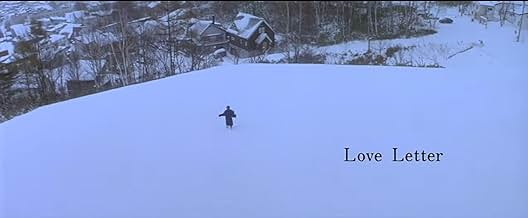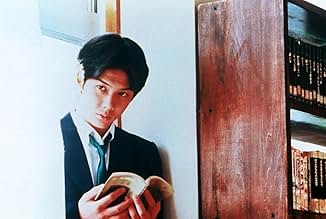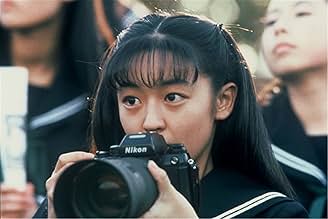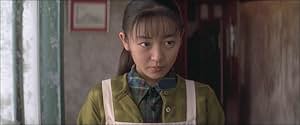Ajouter une intrigue dans votre langueAfter losing her fiance in a fatal mountain-climbing incident, Hiroko was devastated. She comes across his childhood address in a school yearbook and impulsively writes to him. But what happ... Tout lireAfter losing her fiance in a fatal mountain-climbing incident, Hiroko was devastated. She comes across his childhood address in a school yearbook and impulsively writes to him. But what happens when she receives a reply?After losing her fiance in a fatal mountain-climbing incident, Hiroko was devastated. She comes across his childhood address in a school yearbook and impulsively writes to him. But what happens when she receives a reply?
- Récompenses
- 14 victoires et 3 nominations au total
Avis à la une
Knowing that SWALLOWTAIL BUTTERFLY is very different to the rest of his filmography, in terms of themes and sheer scale of the production, I was quite apprehensive about paddling deeper into Shunji Iwai waters. The rest of his movies don't/didn't really sound like "my sort of thing".
LOVE LETTER is based on a strange premise of unlikely coincidence. Two years after his death, Itsuki Fujii's fiance Hiroko (Miho Nakayama) is still having a hard time moving on with her life. When she comes across his old address in his high school yearbook, Fujii's mother tells her that the house was demolished for a highway years ago. Hiroko hence figures that it is safe to send a letter there, seeking closure.
"Itsuki Fujii, O' Genki desu ka?", she writes. "Genki Desu, Hiroko Watanabe".
("How are you, I am well")
Not the most heartfelt expression of mourning, it must be said. Still it makes her feel better... but when she receives a reply to the letter she is a little confused.
"Mostly well... but I have a cold now. Itsuki Fujii"
Is it a letter from heaven? She would like to believe it is. The viewer, however, knows that the reply is actually from a different Itsuki Fujii - a woman (Miho Nakayama) who lives in the same town where Hiroko's fiance grew up. Once the confusion is eventually cleared up, Hiroko and Itsuki begin to write to each other as pen-pals. It turns out that Itsuki Fujii (female) was in the same class as Itsuki Fujii (male), so she tells Hiroko stories and memories from her youth.
The attentive amongst you may have noticed that Miho Nakayama is credited twice above. No, it's not an even more unlikely same-name co-incidence. The same actress plays both Hiroko and Itsuki... I suppose it worked out cheaper that way. The movie is hence hinged heavily upon her performance(s), as most of the 115 minutes is filled with her either writing or reading letters to/from herself.
Thankfully, she is absolutely fantastic in both roles. I think I would have cast her as all the other characters too if I were directing. Thankfully, Shunji Iwai is more sensible than me and kept it to a more manageable 2 parts.
A movie about 2 people writing letters to each other sounds kind of boring, right? The movie is filled with such gorgeous music and imagery that it never gets at all boring though, and Miho Nakayama has such a beautiful voice (and face for that matter) that I could happily listen to her talk for a very long time.
It's not all letter writing though - we also get invited in to see all the little details of both women's lives, and through flashbacks we see quite a bit of the two Itsukis' youth as well (the young actor & actress playing these roles are also very good).
You probably gathered by now that I enjoyed the movie... a lot in fact. It is an absolutely beautifully crafted piece of cinema in every aspect, and utterly fascinating and beautiful to watch. It's a slow movie... at nearly 2 hours it could maybe have benefited from the tiniest bit of editing perhaps... but an incredibly powerful one. I have to admit that it left me in tears when it finished, and I doubt if there are a dozen other movies that have ever had that effect on me.
There is no doubt in my mind that Shunji Iwai is a god of modern cinema. His movies are so well crafted it's almost like he's ripping his talent out of his body and shoving it right up in your face... but not quite so disturbing as that would be. Kurosawa, Kubrick, Iwai... not sounding incongrous to me at the moment. All demonstrate a transcendent understanding of film as a medium, and make almost every other film maker out there look like an amateur!
The first 30+ minutes of "Love Letter" were quite boring, but if you ever watched the movie again, knowing how the plot unfolds, they'd be anything but boring. The premise of this is cool and a little creepy: a woman, enstranged by her husband's untimely death, sends a letter to his old address. She knows that the house was knocked down and built over by a highway years ago, but does it anyway, perhaps out of desperation. Unexpectedly, she gets a reply. From there, the story begins, and it takes a much different direction than how the plot sounds on paper. I can't really say too much without spoiling it, but this is a tragic movie, yet beautiful at the same time. There are flashback sequences that make you really care about several characters in the movie, including the deceased man (who is shown as a school boy in the flashbacks). This is so well set out, and almost brought me to tears at times. Movies like this are what make me want to see more and more Asian cinema, because this was an absolute epic.
Here is another.
There are many factors of the story, and the director(also the writer), Shuji Iwai, tells them beautifully and seamlessly.
Each story could stand on it's own, but in fact it is each story that moves the film.
Though it originally is about Watanabe Hiroko, the character Fujii Itsuki(female) takes over the story to the end.
This is a movie that makes you think about it long after it's over. That's why I bought it. So, I can watch it when ever I want. There are no life lessons to be learned(except maybe listen to the "crazy" grandpa) nor a message to take away from this. Yet, the film grips you until it's finished. Wrapped up in these women's lives and memories, and scenic cinematography that Japanese films are well known for.
In conclusion. I'm still thinking about it.
Hiroko (Miho Nakayama) goes to her ex-boyfriend's memorial service. Itsuki Fujii died on a mountain climbing accident two years ago. When she visits the house of her ex-boyfriend's mother, she finds his high school year book and takes notes of his address. She struggles to overcome the grief coming from losing him at that moment. She sends a letter to Itski Fujii because of romantic reason. Surprisingly, she receives an answer from him. Hiroko knows the address does not exist any longer after it was demolished for a highway construction.
Another female, Itsuki Fujii is a Hiroko's ex-schoolmate who shared the school days with him. Coincidentally she has the same name Itsuki Fujii and she tells many stories about male Itsuki's school life when they were young. Corresponding with letters for that time between them, Hiroko looks back on Itsukii's past and feels slightly jealous about female Itsukii. Moreover, female Itsukii finds another truth that she didn't know about the past. It seems like they are in a love triangle beyond time.
Miho Nakayama plays roles of two women-Hiroko and female Itski -at the same time. Her acting is impressive, especially her crying monologue is very famous. The story is sad but she does not play her role with grief all the time. She acts with the sad feeling in moderation. With her beautiful voice, her acting sparkles pure and elegant.
The director made this film with special camera effects. Some parts of this movie don't have the clear scene and instead he used the foggy, dreamlike scene intentionally. I think he wants to express his feeling with great delicacy, not directly.
Considering only this story, it may look boring but it isn't boring at all while I watch this movie. It is filled with enormous mountain views and poetic music. The background piano music is very popular among people.
In this film, the actors don't say many words but we can feel more than their lines because the dialogue is full of suggestions.The images from this movie still linger in my mind.
The film is very striking visually, in turns showing sweeping landscapes and intimately detailed portraits. Emotions are at times powerfully conveyed by a camera movement accompanied by a well chosen musical score. The limited use of a hand-held camera jarred with the serene beauty of the rest of the film, which no doubt was the intent, but I found it to be a minor distraction.
All in all, a very poetic missive delivered to us by the skilled hand of Shunji Iwai.
Le saviez-vous
- AnecdotesWas the highest-grossing Japanese film in South Korea, except Japanese animation.
- Citations
Male itsuki fujii: [Checking out books from the female Itsuki in the school libray. The male Itsuki holds up five checkout cards that he has been the first to sign like a poker hand. He speaks in English] Fujii Itsuki straight flush.
- ConnexionsReferenced in It's Entertainment (2014)
Meilleurs choix
- How long is Love Letter?Alimenté par Alexa
Détails
Box-office
- Montant brut aux États-Unis et au Canada
- 4 900 $US
- Montant brut mondial
- 7 859 654 $US
- Durée
- 1h 57min(117 min)
- Couleur
- Mixage
- Rapport de forme
- 2.35 : 1
























